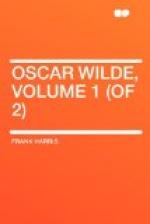CHAPTER XIII
It was weakness in Oscar and not strength that allowed him to be driven to the conflict by Lord Alfred Douglas; it was his weakness again which prevented him from abandoning the prosecution, once it was begun. Such a resolution would have involved a breaking away from his associates and from his friends; a personal assertion of will of which he was incapable. Again and again he answered my urging with:
“I can’t, Frank, I can’t.”
When I pointed out to him that the defence was growing bolder—it was announced one morning in the newspapers that Lord Queensberry, instead of pleading paternal privilege and minimising his accusation, was determined to justify the libel and declare that it was true in every particular—Oscar could only say weakly:
“I can’t help it, Frank, I can’t do anything; you only distress me by predicting disaster.”
The fibres of resolution, never strong in him, had been destroyed by years of self-indulgence, while the influence whipping him was stronger than I guessed. He was hurried like a sheep to the slaughter.
Although everyone who cared to think knew that Queensberry would win the case, many persons believed that Oscar would make a brilliant intellectual fight, and carry off the honours, if not the verdict.
The trial took place at the Central Criminal Court on April 3rd, 1895. Mr. Justice Collins was the judge and the case was conducted at first with the outward seemliness and propriety which are so peculiarly English. An hour before the opening of the case the Court was crowded, not a seat to be had for love or money: even standing room was at a premium.
The Counsel were the best at the Bar; Sir Edward Clarke, Q.C., Mr. Charles Mathews, and Mr. Travers Humphreys for the prosecution; Mr. Carson, Q.C., Mr. G.C. Gill and Mr. A. Gill for the defence. Mr. Besley, Q.C., and Mr. Monckton watched the case, it was said, for the brothers, Lord Douglas of Hawick and Lord Alfred Douglas.
While waiting for the judge, the buzz of talk in the court grew loud; everybody agreed that the presence of Sir Edward Clarke gave Oscar an advantage. Mr. Carson was not so well known then as he has since become; he was regarded as a sharp-witted Irishman who had still his spurs to win. Some knew he had been at school with Oscar, and at Trinity College was as high in the second class as Oscar was in the first. It was said he envied Oscar his reputation for brilliance.




